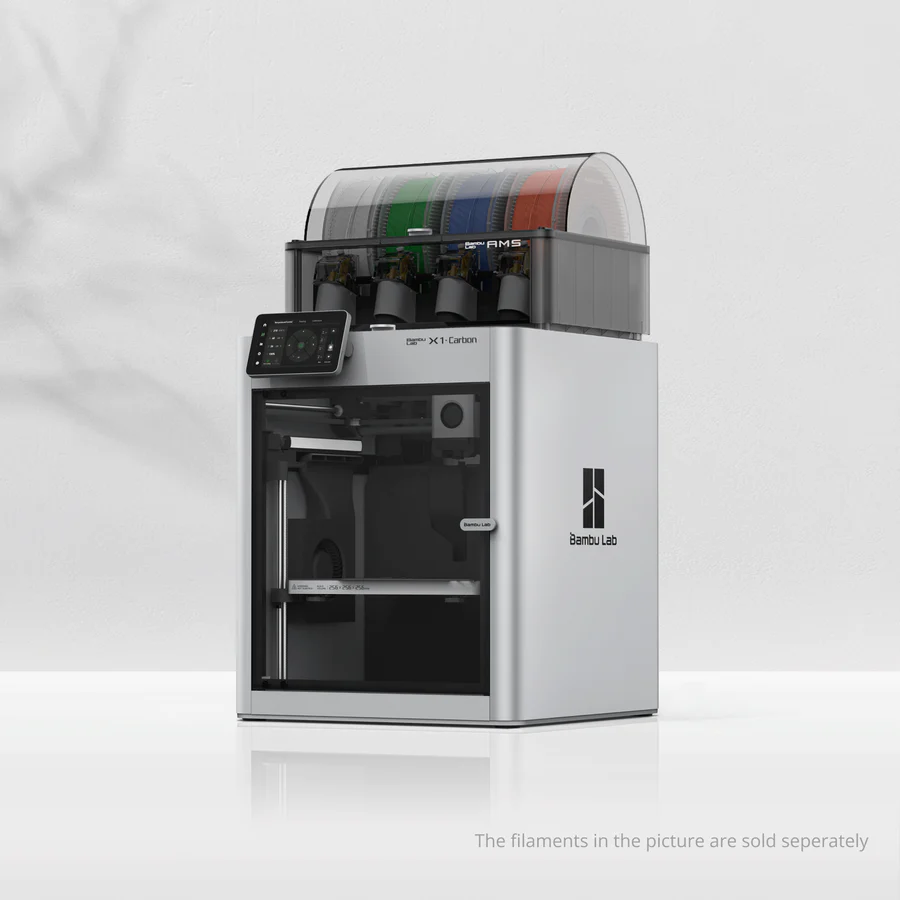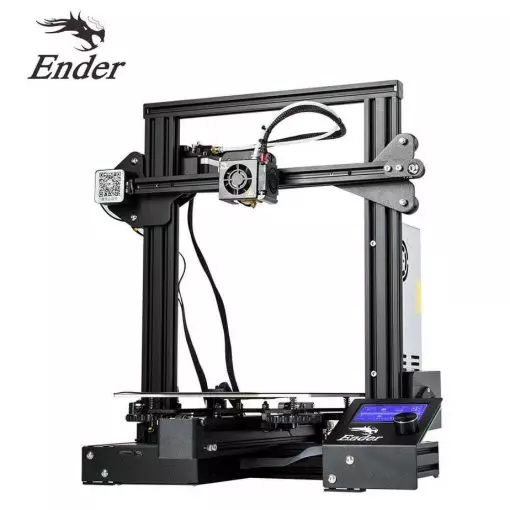Compare X1 carbon vs Ender 3
Comparison between the best 3D printers
Choose the best 3D printer at the best price. The cheapest 3D printers are here.
Buy a 3D printer here with 3D Fila.
 |
 |
|
| Model | X1 carbon |
Ender 3[BUY Ender 3] |
| Printing Material | Filament | Filament |
| Buy Filament for Bambu Lab X1 carbon | Buy Filament forCreality 3D Ender 3 | |
| Estimated price | $1449,00 | $210,00 |
| Manufacturer | Bambu Lab | Creality 3D |
| Release Year | 2023 | 2018 |
| Print Volume [mm] | 256x256x256 | 220x220x250 |
| Printer Size [mm] | 389x389x457 | 440x440x465 |
| Weight [kg] | 14,13 | 6,62 |
| Power Loss Recovery | YES | NO |
| Enclosed printer | YES | NO |
| Bed Leveling | Automatic | Manual |
| Filament End Sensor | YES | NO |
| Bed type | Heated | Heated |
| Power supply system | Direct Drive | Bowden |
| Standard nozzle | 0,4 | 0,4 |
| Maximum Nozzle Temperature [°C] | 300 | 255 |
| Maximum Bed Temperature [°C] | 120 | 110 |
| Maximum printing speed [mm/s] | 500 | 180 |
| Filament holder | YES | YES |
| Camera for supervision | YES | YES |
| Recommended filaments | PLA, PETG, TPU, PVA, PA, PA-CF, Nylon, PC | PLA, TPU, ABS, PETG |
| Recommended slicers | Bambu Studio, Super Slicer, Cura, Prusa Slicer, Orca | Cura, Simplify, Slic3r |
| Maximum Resolution [mm] | 0,1 | 0,1 |
| Processor | Quad ARM A7 1.2 GHz | 8 bits |
| Display | Touchscreen 5'' | Mono |
| Power Supply | 350 W | 24V / 270W |
| Connectivity | Wifi, Bambu bus, Cartão SD | SD / USB |
| Operating systems | Windows, Linux, Macbook | Windows, Mac, Linux |
| Date of registration in the system | 2024-04-10 | 2021-04-13 |
| Release date | 2023 | 2018 |
| Extra features | The Bambu Lab X1 Carbon revolutionizes 3D printing with stunning design, high print speeds, and a streamlined user experience. It stands out with its CoreXY system, a hotend capable of reaching 300°C, allowing for a wide range of filaments. Its LiDAR-assisted bed leveling system, vibration compensation, and AMS multicolor printing capability raise the industry standard. Print quality is impressive, with the ability to fine-tune for perfection. The X1 Carbon, with its closed build volume, not only promises but also delivers one of the most advanced 3D printing experiences available to consumers. | The Ender 3 V1 is a DIY assembly 3D printer, a sales leader since 2017, standing out for its cost-benefit. With a wide printing capacity, it has a CNC machined structure for precision and stability. It offers high-precision prints with low noise, thanks to its innovative V-profile and pulleys. It has a self-adhesive magnetic platform for easy removal of models and excellent adhesion. The Ender 3 heats up quickly, reaching 100°C in 5 minutes, ideal for agile prints. It includes protection against power failures, allowing you to resume printing after interruptions, saving time and material. |
| Support for multiple colors and materials (AMS and CFS) | YES | NO |
Notes * |
||
| Cost-benefit | 7 / 10 | 6 / 10 |
| Hardware | 6.4 / 10 | 0.5 / 10 |
| Tela | . | . |
| Print volume | 4 / 10 | 3 / 10 |
| Performance | 4 / 10 | 1 / 10 |
| [BUY Ender 3] |
Conclusion |
| In comparing the Bambu Lab X1 Carbon and the Creality 3D Ender 3, we see two distinctly different approaches to 3D printing that cater to different types of users and applications. The Bambu Lab X1 Carbon, released in 2023, is a premium, high-performance machine that is packed with advanced features. Its large print volume, automatic bed leveling, and automated filament monitoring fancy a user-friendly experience, making it suitable for professionals or serious enthusiasts. The high maximum print speed, supported by a robust processor, ensures efficiency for complex prints, while its ability to work with a variety of materials enhances its versatility. The closed build design offers improved safety and temperature stability, further contributing to consistent print quality. On the other hand, the Creality 3D Ender 3 is a more affordable option, perfect for hobbyists and beginners. Launched in 2018, it provides a reliable and cost-effective entry point into 3D printing. While it lacks some of the advanced features of the X1 Carbon, such as automatic bed leveling and a filament end sensor, it still produces quality prints, especially with the right modifications. Its simplicity and DIY assembly approach appeal to those looking to learn and experiment in 3D printing without a large financial commitment. Ultimately, choosing between these two printers depends on the user's specific needs and budget. The X1 Carbon is ideal for those who require precision, speed, and ease of use, making it a worthy investment for professional applications. In contrast, the Ender 3 remains a solid choice for those starting their 3D printing journey, offering great value and the potential for hands-on learning and customization. Both printers stand out in their respective categories, providing excellent options for different types of users. |

